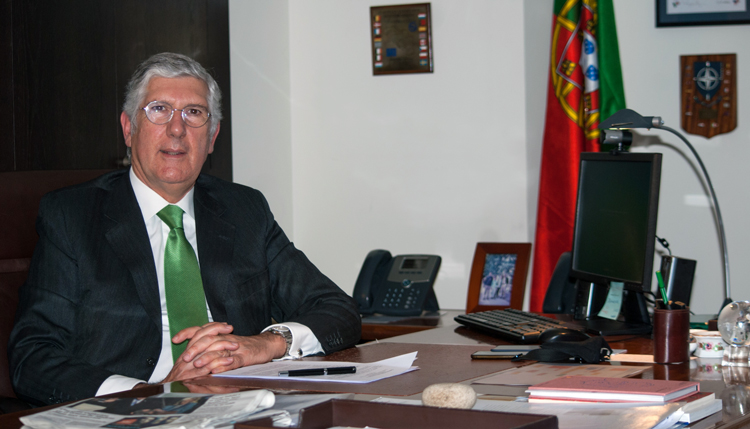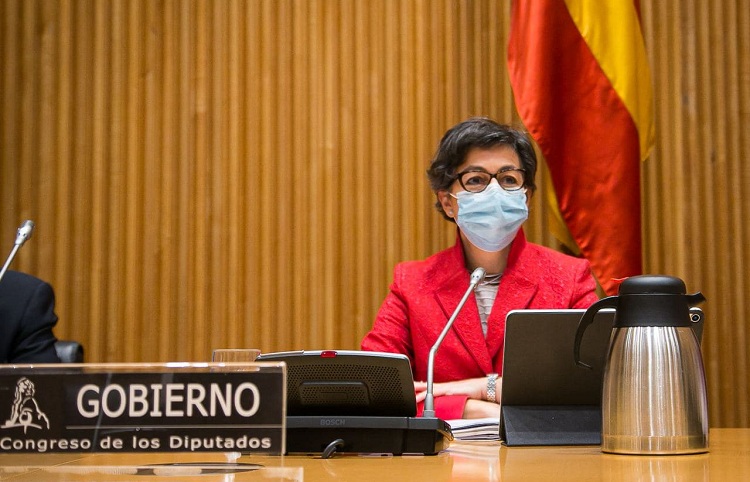Joao Mira-Gomes
Portugal’s Ambassador to Spain
A. Rubio
“It’s been a strange and hard year for diplomatic work”, Joao Mira-Gomes recalls in an interview for The Diplomat’s YouTube channel, as he looks back on his first year as Portugal’s ambassador to Spain. However, he is optimistic: “There is also another word for it: temporary. We have to think that this will pass and we’ll get back to the life we had before Covid-19”.
And after, the snowfall. Did you start to think you were still in Germany?
The five years I was in Berlin it never snowed like it did here. This should make us think about climate change, which is a very important issue on the European agenda. Nobody can deny that it exists and that Portugal and Spain, which are in the south of Europe, are very much affected by it.
In this sense, it is good news that the United States is returning to the Paris Agreement, isn’t it?
Of course, as it is that it wants to return to the World Health Organisation. We need everyone. But it is true that the EU has to lead by example. We have to be the engine of the process against climate change. That is why the motto of the Portuguese Presidency is ‘Time to Act’ for a social, fair, green and digital recovery.
It is often criticised that ‘green’ policies never come to anything. Is it a question of money or political will?
First of all, it is a question of political leaders but also of the population. There are many things that governments can pass, laws and all the rest, but we also need a public opinion that is aware of climate change in order to stop it.
Then, of course, we need money. There are countries in the EU that are still very dependent on coal, on thermal power plants. And to gradually reduce dependence and switch to renewable energies, investment is needed.
Portugal and Spain are far ahead in the switch to renewable energies. We have a very important combination of solar, wind and water resources. This gives us a great capacity to generate renewable energy. In summer all the energy we consume in Portugal is renewable. At the December European Council an agreement was already reached on how to decarbonise the economy.
However, Covid-19 will continue to be at the centre of discussions in the EU.
Our priority and that of the Commission is to have a shock plan against Covid: more vaccines, effective vaccination campaigns, to reach 70% of the population vaccinated by the summer, to better understand the new strains of the virus, to keep the internal market functioning and, a very important point, not to forget the least developed countries, which do not have a vaccine. We must help them. That is why we have to work in a more coordinated way. Going further, we have to think about an EU of health.
Countries where tourism is so important, like Portugal and Spain, in addition to the vaccine we need a system of certificates so that, when summer comes, we can tell people that it is safe to travel. It is very complex because the vaccine is not compulsory and there is also a technological part, related to data protection. That’s why you need the political will to do it.
How are you going to organise the summits in your semester, face-to-face or virtually?
We are in a model of virtual meetings, but we would like some of them to be face-to-face, especially the Social Summit on 7 and 8 May in Oporto. This is one of the central issues of our Presidency. We have to work on the European pillar of social rights – employment, equality, training – with civil organisations, trade unions and employers to arrive at what could be the Porto Declaration. If not, the social consequences of the pandemic will be enormous.
We want to organise a summit with India, which is a very important partner, to talk about climate, trade, digital transformation and because we believe that we need to have closer relations with the Indo-Pacific region. That way we would be balancing the strategic relationship we have with China.
What about Africa?
Working with Africa is always a priority. We want to organise the summit with Africa that was planned for the end of 2020. And there we will talk about climate transition. But it is not only Africa, there is also Latin America, Mercosur, the agreements with Mexico and Chile, and an event that will be very important: the anchoring of the submarine data cable between Fortaleza and Sines. Five centuries after the voyage of Magellan and Elcano, we are connecting Europe and Latin America on the fundamental issue of secure and fast data transmission.
Finally, we still have work to do on Brexit to complete the agreements. We want the relationship with the UK to be as close as possible.
The EU is not as weak as it seems despite the crises it has been going through.
From crisis to crisis we also strengthen the EU. I always ask people, do you think we would be better off without the EU? Would we as individual countries respond better to the Covid crisis? Of course not. What is important is that citizens feel how the EU helps them. That is why we want to launch the recovery programme in June, as soon as possible.
The Conference on the Future of Europe is very important for us. We have to answer two questions: what we want from the EU and what role it should play. If we answer them, we will have taken a big step. The logo of the Portuguese Presidency is a rudder. And that is the idea. We need to have a direction, to know where we want to go. We need to walk together.
What would you highlight from the Guarda Summit?
That, for the first time, we have approved a very ambitious common strategy for cross-border development. It is a vision shared by both governments to develop a region that is very backward in both countries and which has great potential.
We also talked about the recovery plan and how we can coordinate our plans in strategic areas such as energy, environment, digital agenda, tourism, infrastructures?
What about the high-speed train?
For us it is very important in terms of environment, but also for the recovery plan. Portugal has to start with the Lisbon-Porto connection. And then we want to get to Vigo, where we would already be connected to the Spanish AVE. But also south of Porto we would like to make the connection to Salamanca.
What we are already building is an AVE for freight between Lisbon and Sines that will connect with Madrid. And that will facilitate the connection for passengers. We are going to reach Madrid in different ways. And also, through the south, we are going to connect the Algarve with Huelva and with the Mediterranean axis. The AVE is a priority and we are not going to have just one, but several.
A cultural promotion plan also came out of Guarda.
A study was presented on the international impact of Spanish and Portuguese. If we coordinate promotion, I think we will go much further.
And there were other issues that we will continue to work on. Green hydrogen, for example. We are the European countries with the best conditions to produce it based on renewable sources. And we also talked about forging a lithium alliance. Not only to extract and refine, but to produce lithium batteries, to grow in the value chain.
Would you make a positive forecast for 2021?
I would like to arrive at the end of the Presidency with a very advanced vaccination plan, Covid under control, recovery plans in place and, above all, with a strong feeling among citizens that the European Union makes a difference. I don’t want to make forecasts beyond June, but I will be satisfied if we arrive with one or two of these objectives fulfilled.







